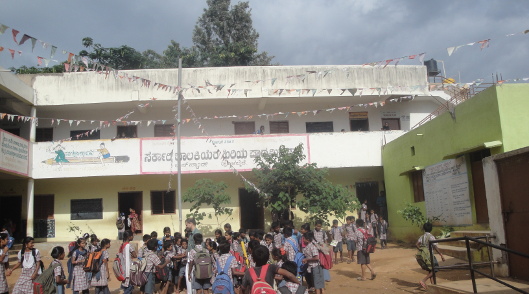Tata Trust gave a grant to Shiva Sri Charitable Trust (SSCT) to strengthen and up scale their school education model in Government Higher Primary Schools in Chitradurga and Davangere, and to conduct capacity building for the State Government to sustain the program. The school education model of SSCT has the following components - curricular and resource inputs in the form of Mathematics work books, writing booklets and learning map, motivational component in the form of Stars, formation of Student clubs and development of a Digital ‘App’ for student learning and teacher facilitation.
The Trust asked IT for Change to design and conduct an impact assessment of the program. Through a study of existing materials relating to the program, interactions with representatives of SSCT and Trust and field interactions with teachers, students and teacher educators, data relating to these components was collected. This document is a report of the impact assessment of the program, and is based on an analysis of the data collected.
The mathematics work books, writing booklets, are given to students to provide them opportunities for working. Three work books and Three booklets were provided to each student in classes 4 - 7 in the schools. Three kinds of Stars were given by teachers to students to reward accomplishments in academic, co-curricular and larger school processes. Student clubs were set up in these schools to provided opportunities for students to play a larger role in school activities. SSCT designed and developed an ‘app’ using which, teachers can upload data pertaining to student completion of the work books, booklets and teacher educators can record data from school visits.
Based on the feedback from students, teachers and teacher educators, it seems that the students have used the mathematics work books and writing booklets for working on activities in mathematics and other subjects. Teachers and students have responded positively to the giving of stars for accomplishments in academic and co-curricular areas. Student clubs are reported to be providing opportunities for students for group learning and organizing school events. The learning map and the digital app were not used and hence no feedback could be collected.
The scalability and sustainability of these components depends to a large extent to which these are integrated into the regular activities of the school and of school system (particularly teacher education). However, as reported by the teachers and teacher educators, the academic components are largely not integrated into the teacher's current transaction and assessment processes. There is a need to review and strengthen teacher preparation and teacher educator capacity building for integration of the program components into the regular processes of the school.
The Star component requires further study by experts in education psychology and research to understand its larger and longer term implications. The app in its current design appears to support administrative monitoring than academic support.

